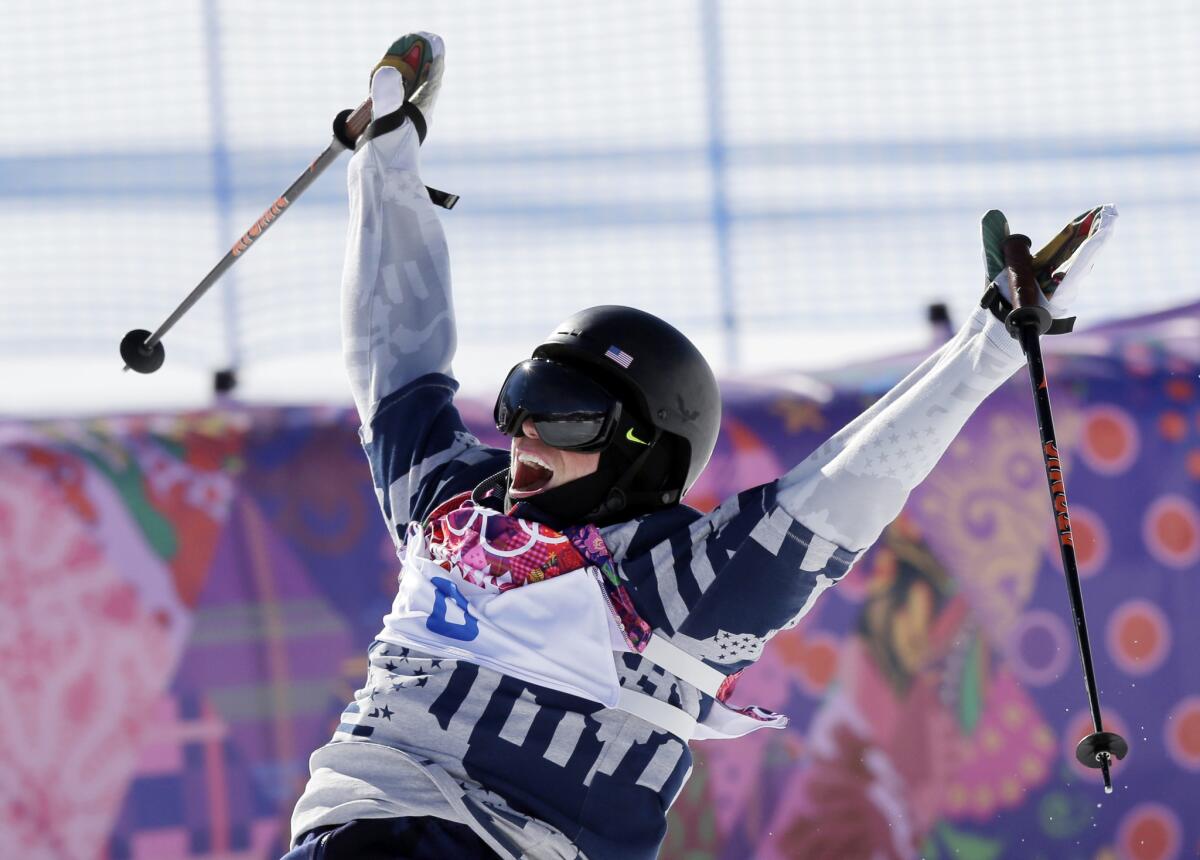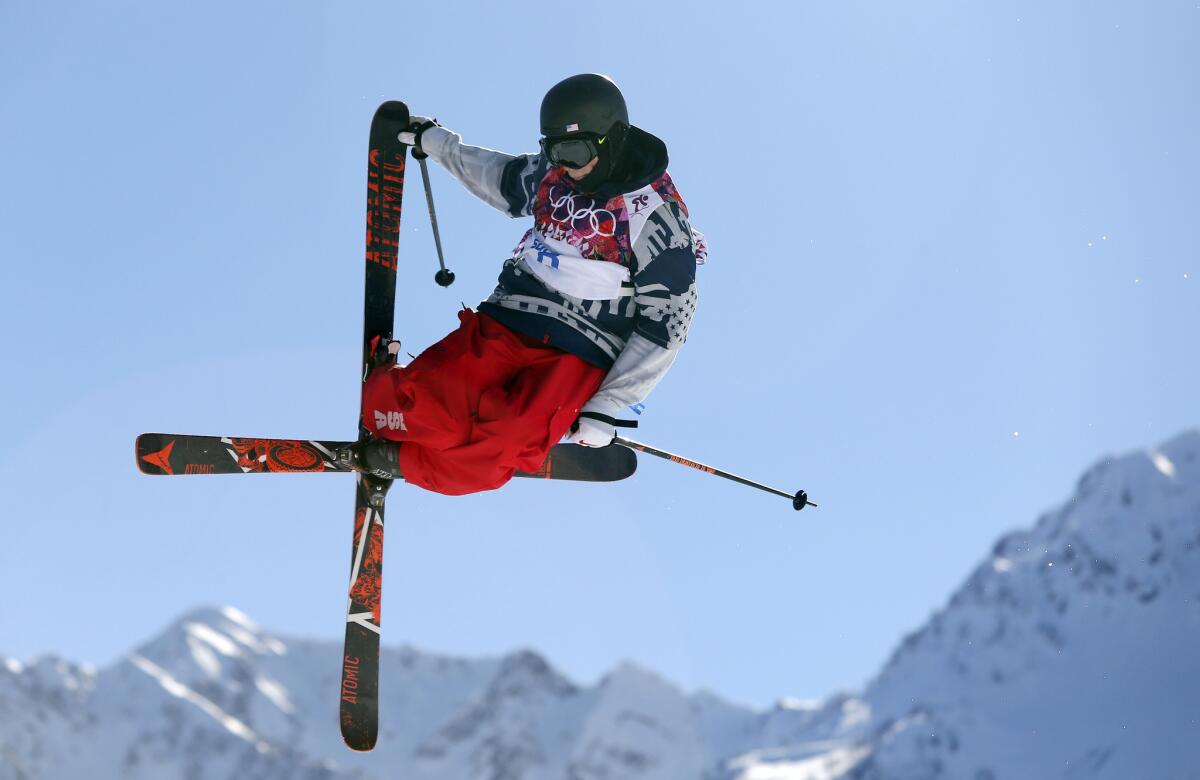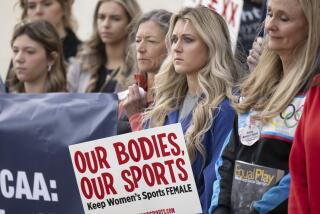Olympian Gus Kenworthy came out as gay in 2015, and to his surprise he became more popular

The big surprise came moments after his final jump, after Gus Kenworthy nailed a difficult maneuver to grab the lead at a slopestyle competition in the Colorado mountains.
Skiing to the bottom of the course, he noticed flashes of purple, blue and orange in the crowd.
“Amazing,” he says.
It was the winter of 2015 and Kenworthy had just come out as a gay man. He wasn’t the first pro athlete to make this sort of announcement, following the lead of NBA center Jason Collins, soccer standout Robbie Rogers and college football player Michael Sam.
Still, it was a tough decision.
“I had built myself up for the worst-case scenario,” he recalls. “I was literally scared I was going to lose sponsors, lose my fan base and stop getting invited to events.”
The freestyle skier quickly discovered the climate has shifted for gays in sports. His first clue? Those fans at the Dew Tour event in Breckenridge who waited at the base of the hill, waving rainbow flags.
“It’s just so crazy,” he says. “I was overwhelmed by the amount of support I got.”
Teammates and competitors rallied around him. So did corporations such as Visa, Toyota and Procter & Gamble, stepping forward with endorsement deals heading into the 2018 Winter Olympics.
If anything, coming out made Kenworthy more popular — and marketable.
“What brands like Procter & Gamble need to sell soap is an emotional connection,” says Andy Rohm, a marketing professor at Loyola Marymount. “They need people with real stories to make their products stand out.”
Celebrity was not new to the 26-year-old Kenworthy, who was born in England and moved to Telluride, Colo., as a kid. He won silver at the 2014 Winter Games in Sochi and generated a buzz on social media by rescuing puppies off the streets of that Russian city.
But freestyle skiing was still relatively new to the Olympics, not as mainstream as snowboarding, so his fame was limited. There was reason to fear living openly.
“This was his livelihood, his income,” says Michael Spencer, his longtime agent.
When Martina Navratilova came out in the early 1980s, she estimated it cost her $10 million in endorsements. Kenworthy took a chance if only because he worried about his skiing.
Freestyle can be a risky sport. In the halfpipe version, competitors launch themselves high into the air; on the slopestyle course, they perform acrobatic tricks off rails and jumps. Mistakes can mean torn knees and dislocated shoulders.
Keeping a secret, Kenworthy says, “was something ever-present, always distracting me.”
Deciding to tell his story to ESPN The Magazine, he had to wait a month between the interview and the publication date. It was a nervous time, without much sleep.
The morning his article hit the stands, Kenworthy was flooded with so many calls and texts that his cellphone briefly shut down. Though the predictable internet trolls spewed hatred, the reaction was mostly positive.
“It made all of us kind of realize, dang, that was cool,” teammate Aaron Blunck says. “I just kind of gave him that respect — ‘Hey, man, we’re proud of you.’ ”
Some friends called to apologize for past instances when they had uttered derogatory phrases. Competitors soon noticed a change in Kenworthy on the mountain.
Always the nervous type before competitions, he seemed a little more at ease, winning in Breckenridge and finishing second in the halfpipe standings on the World Cup circuit that season. The next year brought medals in superpipe, slopestyle and big air at the X Games.
“He doesn’t have to hold back or have something eating away inside of him,” teammate Maddie Bowman says. “He’s been skiing his best.”
Things went just as well off the slopes for Kenworthy, who attracted little sponsorship interest in Sochi but fielded multiple offers a year later. His good looks and genuine personality helped.
As a marketing professor, Rohm understands Kenworthy’s appeal as an endorser but also suspects that corporations face a challenge in how they use him.
“You don’t want to come off as too overt, like we’re sponsoring a gay man, we’re cool,” he says. “That can come across as being disingenuous. The storytelling has to be more about his struggle or the courage he needed to have.”
Some sponsors suggested ad campaigns that made Kenworthy cringe, but over the last two years most have found a reasonable balance between his personal life and his athletic achievements.
A recent Head & Shoulders commercial features a montage of images that show him dressed in U.S. team gear, then holding a rainbow flag overhead, and then soaring off a slopestyle jump.
“My shoulders carry more than my country’s pride,” he says in the spot. “They carry my community’s pride, my family’s pride … and pride in myself.”

This notion has resonated with LGBTQ fans who now show up at his competitions. Other freestyle skiers have noticed the new contingent. As Bowman says: “The more, the merrier.”
Sometimes Kenworthy must explain the sport to these newcomers. Sometimes they ask him why he doesn’t win every time. He figures it is a small price to pay for being “the gay skier.”
With all the success and financial gain that have come his way, there is also a sense of responsibility.
That means more than taking a few minutes to speak with fans. It means giving interviews and doing photo shoots, anything to get his message across.
The distractions might have cost him — when the U.S. freestyle team was announced last week, he made the slopestyle roster but fell short in halfpipe. Still, when he and figure skater Adam Rippon arrive in South Korea, it is believed they will become the first openly gay Americans to compete in the Winter Olympics.
Kenworthy wonders if that will make a difference back home. He wonders what it would have been like to have a gay role model in sports when he was young.
“That would have given me so much hope,” he says. “And saved me so much heartache.”
Those bright flags in the crowd? The support from people around him?
When Kenworthy twists and flips down the course in Pyeongchang, he will hope for more than style points. He wants to give some of that feeling back.
Follow @LAtimesWharton on Twitter
More to Read
Go beyond the scoreboard
Get the latest on L.A.'s teams in the daily Sports Report newsletter.
You may occasionally receive promotional content from the Los Angeles Times.







